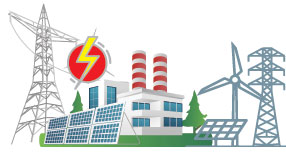Solar power unit price Tk 11 in Bangladesh
But Tk 3.5 in India
Staff Correspondent : In July last year, tenders were invited for solar power plant projects with a total capacity of 2,000 MW in India. Six companies have got the power plant construction work by participating in the tender called by the country’s state-owned Solar Energy Corporation of India (SECI). The companies can construct power plants of the contracted capacity anywhere in India.
These will be operated on a ‘build-own-operate’ model. Under the 25-year agreement, SECI will purchase electricity from the companies and sell it to local distribution companies.
The purchase agreement of SECI with the companies has set the price of electricity at 32 cents per kilowatt. According to the latest exchange rate, this price in Indian currency stands at Rs 2.60 per unit (kWh). And its amount in Bangladeshi currency stands at Tk 3.52 (per dollar = 110 taka).
India’s state-owned renewable energy sector company SJVN Green Energy has signed an agreement with two local companies to buy electricity at a slightly lower price than this. The company recently signed a 25-year agreement to purchase a total of 600 MW of electricity from two Rajasthan-based solar power projects.
According to a statement by the country’s power ministry, one of these projects will supply 500 MW of electricity at Rs 2.57 per unit (kWh). If calculated in Bangladeshi currency, the amount of this expenditure stands at Tk 3.40. Another project will supply 100 MW of electricity at Rs 2.62 (Tk 3.47) per unit (kWh).
Like India, Bangladesh is now accepting and approving various projects to increase the production capacity of renewable electricity including solar. As a part of this, last Thursday, the Cabinet Committee on Government Procurement approved the contract for the purchase of electricity from three solar power plants (each with a capacity of 100 MW) with a total capacity of 300 MW in Khulna, Moulvibazar and Rajbari districts.
The Center will purchase electricity from the Bangladesh Power Development Board (BPDB) on a ‘no electricity, no payment’ basis for a period of three to 20 years. It will cost Tk 11 per unit of electricity from these centers. The total cost of the government will be Tk 10,612.80 crores.
Earlier, in the latter half of last year, the government had signed an agreement with other approved solar power plants to purchase electricity at Tk 10-11 per unit. On December 27, 2023, four more solar power purchase agreements were approved. In these 20-year contracts, the price of electricity per unit has been fixed at around Tk 11.
The government will have to pay a total of Tk 15 thousand crore to the four power plants in 20 years.
From August to December of last year, the government has approved a total of 981-megawatt capacity of environmentally friendly energy-based power plants. All but one of these are waste-based and all are solar-based. In the approved purchase agreements with these solar power plants, the price of electricity per unit is fixed from around 10 paise to 70 paise to around Tk 12.
While the increase in capacity of the renewable sector and the purchase agreement on ‘no electricity, no payment’ terms are welcomed, experts in the power and energy sector say that the cost per unit of solar power in the country is still much higher than that of neighboring India and other countries.
Due to intense competition in India’s power sector, it is possible to purchase electricity from companies there at lower prices. And due to lack of proper competition in Bangladesh, the cost per unit of solar power is Rs 6-7 more than in India. It is necessary to reduce this expenditure to reduce the financial pressure on the entire power sector including BPDB.
Experts suggest that the government should create an environment of competition in all types of electricity, including solar, to reduce the price of electricity in purchase contracts. In addition to this, they believe that steps like assistance in land acquisition, construction of transmission infrastructure and more policy support for import of solar components should be taken.
Director of United International University (UIU) Center for Energy Research Professor Shahriar Ahmed Chowdhury told the media, “If a competitive market is created, it is possible to further reduce the price of solar electricity.” Besides, if assistance is provided for land and construction of transmission lines, the price of electricity can be reduced in the purchase agreement. In the case of India, land and transmission infrastructure are supported by the country’s government. Due to which the production cost of solar power has decreased there.
According to the Cabinet Committee on Government Procurement sources, since August last year, the government has signed power purchase agreements with a total of 12 solar power plants. The total capacity of these power plants approved in the last eight months is 1,281 MW. These power plants will be built in different districts of the country by private and joint ventures. Each of the centers have a tariff of Tk 10 or more per unit of electricity.
Top officials of the power department say that the price of solar power in the purchase agreement has come down compared to earlier. The price of solar panels in the global market is now downward. In the coming days, it will be possible to make more cost-effective purchase agreements with such power plants.
In this regard, the Director General of Power Cell, an electricity policy and research institute, Engineer Mohammad Hossain told media, “Solar power purchase contracts are being made at a lower price than before in Bangladesh. In the coming days, the opportunity to do it at a more affordable price is being created.
President Joe Biden tests positive for COVID-19 while campaigning in Las Vegas, has ‘mild symptoms’
International Desk: President Joe Biden tested positive for COVID-19 while traveling Wedne…








